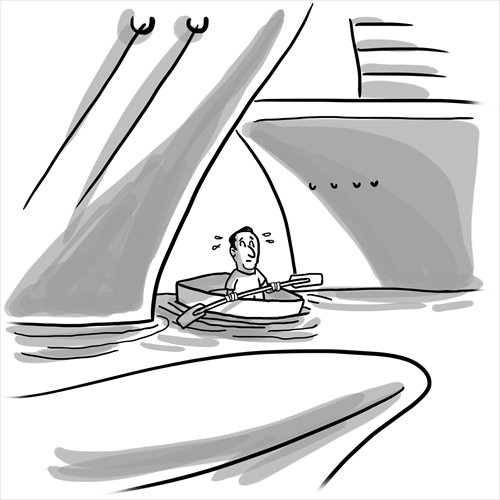Arms ban lift puts Vietnam in tight squeeze

Illustration: Liu Rui/GT
US President Barack Obama visited Vietnam last week, a tour he made during his last year in office. The most highlighted part of the tour was Obama's announcement over the lift of the arms embargo against Vietnam, which includes all kinds of conventional weapons. Before that, few people had ever expected that Washington would do so.
Both the US and Vietnam are in need of improved bilateral ties. For the US, Vietnam is directly involved in the South China Sea situation, making Hanoi an important part in the US' Asia-Pacific strategy.
As Vietnam does not hold an advantageous position in the complicated South China Sea issue, militarily or economically, Hanoi also needs support from major powers outside the region. However, given the long-term hostility between the US and Vietnam, currently there is a severe shortage of mutual trust.
It is widely believed that the US is courting Vietnam with the lifting of the arms ban in the hope to turn Hanoi into a foothold for the US in the South China Sea.
Washington's ambitions in the South China Sea are not limited to Hanoi, as the US already has many footholds in the region, including the Philippines, Singapore, Guam and Australia. However, there is a third party that always influences the ups and downs of the US-Vietnam relationship, and that is Russia.
During the Cold War, given the shared ideology between Vietnam and the former Soviet state, today's Russia, the two sides have maintained an unusual diplomatic relationship. Northern Vietnam and Southern Vietnam respectively sided with the former Soviet state and the US. After the nation's unification, Vietnam allied with the USSR.
But following the Cold War, Russia no longer held its former global influence, and its relationship with Vietnam was also normalized. Meanwhile, Hanoi's ties with Washington have also gradually improved.
Undoubtedly, Washington-Hanoi relations will be subject to Russia-Vietnam ties. Similarly, the changes of the former will also pose certain impacts on the latter.
With the US' increasing interference, the South China Sea problem is no longer a regional one. Although Russia is not directly connected to the waters, as a self-identified major power with international influence, Moscow also wants to have its say. Russia's point of influence is Vietnam, given that other South China Sea nations are not necessarily willing to see such an unstable factor as Russia step in.
Moreover, after being banned from purchasing lethal weapons by the US, Vietnam could only import arms from Russia and former Soviet states. Vietnam's rapid economic growth in recent years saw Hanoi purchase large amounts of advanced weaponry from Russia. So far, Vietnam has become the world's eighth-largest arms importer, and is of crucial importance to Russia's arms industry, which has been plagued by a shortage of capital.
Once the US ban on arms sales to Vietnam is lifted, Moscow will have to compete with Washington for deals with Hanoi. Till now, Russians generally are not concerned with such competition, as Vietnam has only a limited military budget and Russia's technology is priced 10- to 15-percent cheaper than that of the US.
Although the US' lift of the arms ban seems like a friendly gesture toward Vietnam, it is a calculated move.
Washington's future Vietnam policy will be a "carrot and stick" approach. Any weapons sales between the two countries will come with strict rules.
The US is hoping to drag Hanoi to its side while preventing Vietnam from developing closer relationships with China and Russia. The US is also seeking to influence Vietnam's ideology through human rights issues.
Hanoi has been sticking to its "three nos" defense policy for years - no military alliances, no foreign military bases on Vietnamese territory, and no reliance on any country to combat others. It does not want to completely side with any major power. What it hopes is to maximize its own interest through competition between Russia and the US.
However, it is not easy for Vietnam to juggle both Moscow and Washington, especially since other nations, including China, Japan and ASEAN, are all involved in the South China Sea issue, making it likely for Vietnam to become a victim of this game between major powers.
The author is a PhD candidate at the Center for Russian Studies, East China Normal University. opinion@globaltimes.com.cn Follow us on Twitter @GTopinion